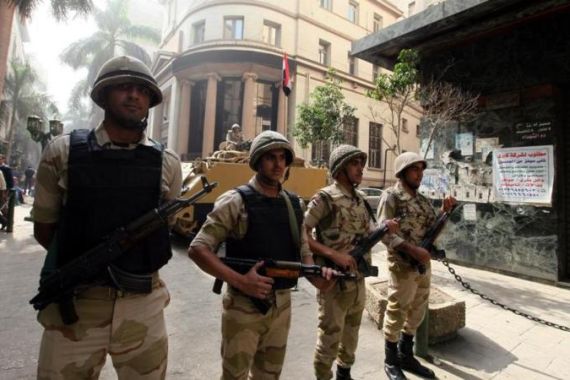Egypt: After the coup
The fall of Mohamed Morsi and the Muslim Brotherhood means instability is likely to continue.

It was a year to shatter myths in Egypt, as the man who was accused of trying to become another Hosni Mubarak was booted from power just one year into his presidency, his swift fall underscoring how little control he actually had over the state.
Many of Mohamed Morsi’s critics started 2013 fearful that Egypt’s first democratically-elected president was amassing dictatorial authority. Morsi and his allies rushed through a constitution despite widespread criticism from liberals and secularists. The president issued, and then revoked, a decree granting him near-absolute power. His Muslim Brotherhood party seemed poised for another big win in parliamentary elections scheduled for spring.
Yet by the following winter Morsi would be in prison, along with most of the Brotherhood’s leadership. Some of the public would shrug, even applaud, as thousands of his supporters were gunned down in the streets. And a new military-backed interim government would be busy drafting a new constitution and organising elections with little input from Islamists.
In one sense, perhaps Morsi did follow in Mubarak’s footsteps: Both presidents lost their legitimacy after widespread public protests, but were ultimately forced out by an army intent on asserting its primacy in political life.
It was an ironic end for Morsi, who was thought to have asserted civilian control over the army when he sacked the longtime defence minister, General Mohammed Hussein Tantawi. His hand-picked replacement for Tantawi, General Abdel Fattah el-Sisi, led the coup against him less than a year later.
Morsi’s supporters continue to demand his return in daily protests, though their numbers have dwindled as the crackdown has deepened.
Road map?
But much of the country has moved on, headed for the first milestone on the army’s post-Morsi “road map,” a January vote on a new constitution. Precedent suggests it will pass: Never in Egypt’s modern history has a referendum been voted down.
The results will be an important barometer for the public mood, however. About one-third of eligible voters cast their ballots for the Morsi-era constitution, which was approved by a 64 percent margin; the new charter will need comparable numbers to give the government a claim to legitimacy.
Beyond that, the road map calls for parliamentary elections in the spring and a presidential ballot by early summer. But the constitution allows interim President Adly Mansour to reverse the order, which he may do in order to give Egypt’s notoriously disorganised liberal parties time to prepare for the legislative vote.
They are unlikely to field many presidential candidates, particularly if Sisi himself decides to run. His intentions are unclear. The general is probably the only candidate who could excite a public weary of elections and frustrated with Egypt’s sclerotic political class. But taking off his uniform and ascending to the presidency would make him responsible for fixing the country’s myriad problems.
Foremost among those is the economy, which none of Egypt’s post-revolutionary governments have shown the expertise or courage to fix. The country muddled through 2013 on the largesse of Gulf states, but their support comes with an expiration date. With inflation rising and foreign reserves dwindling, it could be the economy, not the worsening political polarisation, that fuels anger towards the country’s soon-to-be-elected leaders.
Follow Gregg Carlstrom on Twitter: @glcarlstrom